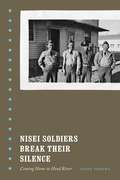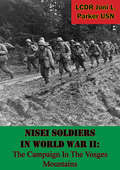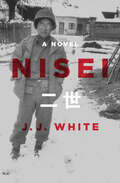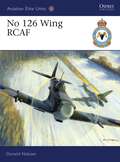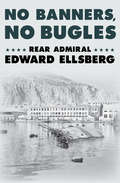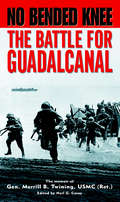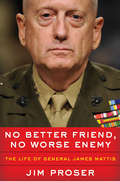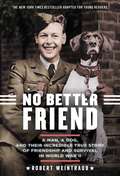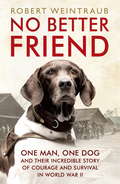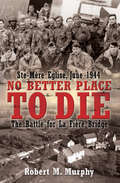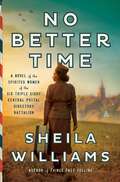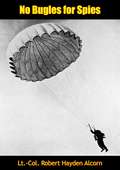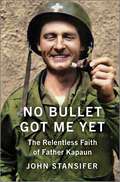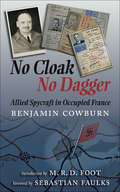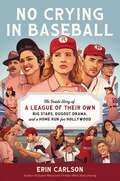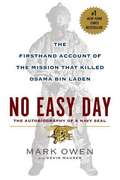- Table View
- List View
Nisei Soldiers Break Their Silence: Coming Home To Hood River
by Linda TamuraNisei Soldiers Break Their Silence is a compelling story of courage, community, endurance, and reparation. It shares the experiences of Japanese Americans (Nisei) who served in the U.S. Army during World War II, fighting on the front lines in Italy and France, serving as linguists in the South Pacific, and working as cooks and medics. The soldiers were from Hood River, Oregon, where their families were landowners and fruit growers. Town leaders, including veterans' groups, attempted to prevent their return after the war and stripped their names from the local war memorial. All of the soldiers were American citizens, but their parents were Japanese immigrants and had been imprisoned in camps as a consequence of Executive Order 9066. The racist homecoming reception that the Hood River Japanese American soldiers received was decried across the nation.
Nisei Soldiers In World War II: The Campaign In The Vosges Mountains
by LCDR Joni L. Parker USNThis study is about the 442nd Regimental Combat Team during World War II as it assisted VI Corps in the push through the Vosges Mountains in northern France. The 442nd RCT was composed mostly of Japanese-Americans, or Nisei, who volunteered to join the U.S. Army. Behind their contributions were U.S. government policies which precluded Japanese immigrants from citizenship and land ownership, and culminated in the relocation of more than 110,000 Japanese-Americans from the West Coast of the United States.This study briefly examines the Japanese in America, the formation of the 442nd RCT, and its exploits. Its involvement in the campaign through the Vosges Mountains began with its attachment to the 36th Infantry Division on 13 October and ended on 9 November 1944. This study examines the four battles during the campaign to take Bruyeres, Biffontaine, the Rescue of the "Lost Battalion," and the follow-on mission.This study examines the combat and environmental conditions in the Vosges Mountains. It shows military decision-making from the corps level to regiment level and, in some cases, to company level. It provides a balanced review of events to promote historical accuracy.
Nisei: A Novel
by J.J. WhiteIn this gripping novel, a man in despair stumbles upon the secrets of his Japanese father&’s World War II experiences, and the past that shaped his family. Robert Takahashi sits in the empty attic of his mother&’s old home in Hawaii, a home he has to sell to cover financial losses from her nursing home care—and his own massive gambling debts. Once his affairs are in order, he can proceed to the next step: suicide. His wife is done with him anyway. His daughters—well, he&’s nothing but an embarrassment to them. Robert barely remembers his father and knows little about his parents&’ past. But a manuscript he&’s just found—left under an eave and contained in a dusty box along with ten medals from the US military—will enlighten him about many things. As he reads his father&’s words, he discovers a story of a Japanese boy born in Hawaii, a life uprooted by internment, and a young Nisei&’s harrowing quest to prove his patriotism by serving with the renowned 442nd Regimental Combat Team. He also learns about a long-ago forbidden love—and how prejudice can derail a life—in this sweeping tale of family, war, and two generations of men battling powerful forces both externally and within themselves.
Niños: Poems for the Lost Children of Chile
by María José FerradaOn September 11, 1973, a military coup plunged Chile into seventeen long years of dictatorial rule. Only the return of democracy could reveal the full horrors of Augusto Pinochet&’s regime: 3,197 people dead or disappeared—including thirty-four children under the age of fourteen. This book is a stirring memorial to those victims and to the cost of extremism. Thirty-four poems—one for each child lost—consider the diverse hopes of these fragile young lives. From Alicia to Jaime, Héctor to Paola, Soledad to Rafael, they were brave and creative, thoughtful and strong. In these pages, some children watch for the changing seasons. Some listen for new sounds on rainy afternoons. And some can&’t wait for their next birthday. Featuring gentle, emotive poems and soft, pastel-toned illustrations, Niños is an unforgettable tribute to the children of Pinochet&’s Chile and all those threatened by political violence across the world.
No 126 Wing RCAF
by Chris Davey Donald NijoboerThe success of No 126 Wing began before the D-Day landings, but its phenomenal performance after the Normandy invasion has no simple explanation. True, it profited from being in all the right places at all the right moments during the war - D-Day and the breakout, Falaise Gap, Operation Market Garden, the winter offensive in the Ardennes, and crossing the Rhine into Germany. But other wings with 2nd TAF participated in the same operations, without achieving nearly the same success as No 126. As a self-contained unit, the five squadrons of Spitfires of No 126 Wing were self-sufficient in everything they did. When the order came to move - men, fuel, ammunition and everything vital for its operation picked up and drove to the next farmer's field or suitable meadow. Often traveling in the dark on bombed out roads, these ground units did an amazing job of not only finding their new bases of operation, but preparing the field for the fighters ready for the next day's flights. Every landing strip was temporary and just miles from the frontline. Home was a tent, a slit trench a place of safety. Dysentery was a common companion, making some pilots too weak to fly. Often they were shelled by German artillery and mortars, and many times they found themselves behind enemy lines. This is a truly unique look at one of the most effective air force units ever devised. Before D-Day 1944, a mobile fighter wing had never been tried before, but after the Normandy landings the ground forces could not move without their valuable support. This book examines the wing's operations chapter by chapter as defined by the major ground operations. It also highlights the effectiveness of the Spitfire in the fighter-bomber role, as well as in its more familiar air-superiority mission - the Spitfire clearly dominated the skies over the advancing armies and proved itself once again to be the most effective fighter of World War 2. But as successful as the wing was, it was only as strong as the young men who gave so much of their physical strength, intelligence and courage to make it happen. Squadron biographies, therefore, are also included, as well as biographies of the top aces and a close examination of the day-to-day operations of a mobile fighter wing.
No 617 'Dambuster' Sqn
by Chris Davey Alex BatemanMost famous for the dambusting raid in the darkest days of the Second World War, the No 617 Sqn were a vastly experienced crew. It was the first, and only, squadron to use certain equipment and weapons in combat. This study covers the history of the No 617 Squadron. It explains the men, aircraft, weapons and operations of this squadron.
No Angel
by Penny VincenziFrom the Sunday Times bestselling author Penny Vincenzi, NO ANGEL is the first novel in the acclaimed Spoils of Time trilogy. 'Penny Vincenzi dazzlingly combines the old-fashioned virtues of gripping storytelling with the up-to-the-minute contemporary feel for emotional depth and insight into the lives of the characters. She is a supreme stylist and clever writer. Reading her is an addictive experience'-Elizabeth Buchan.In pre-war London, Lady Celia Lytton is the perfect host. Beautiful, intelligent and determined, she throws glittering parties, publishes bestselling books, and enjoys her young family and loving husband. But there are tragedies her family will not escape: the Titanic, the First World War, the flu epidemic. And beneath their perfect image, the Lyttons cannot ignore the changing world around them. In the shattering aftermath of the War, Celia is beginning to understand that there will be a price to pay for the life she has chosen, that is greater than she could ever have imagined...
No Angel
by Penny VincenziFrom the Sunday Times bestselling author Penny Vincenzi, NO ANGEL is the first novel in the acclaimed Spoils of Time trilogy. 'Penny Vincenzi dazzlingly combines the old-fashioned virtues of gripping storytelling with the up-to-the-minute contemporary feel for emotional depth and insight into the lives of the characters. She is a supreme stylist and clever writer. Reading her is an addictive experience'-Elizabeth Buchan.In pre-war London, Lady Celia Lytton is the perfect host. Beautiful, intelligent and determined, she throws glittering parties, publishes bestselling books, and enjoys her young family and loving husband. But there are tragedies her family will not escape: the Titanic, the First World War, the flu epidemic. And beneath their perfect image, the Lyttons cannot ignore the changing world around them. In the shattering aftermath of the War, Celia is beginning to understand that there will be a price to pay for the life she has chosen, that is greater than she could ever have imagined...
No Banners, No Bugles
by Rear Admiral Edward EllsbergThe little-known WWII story of the salvage engineers whose daring and heroism helped the Allies win back North Africa, by the author of The Far Shore. By the time America joined World War II, Edward Ellsberg had already earned his place as one of the world&’s great marine salvage engineers, and his bestselling accounts of raising doomed submarines and histories of classic diving operations had made him a literary star. With America&’s entry into the war, Ellsberg returned to active duty with no easy assignment: clearing the vital port at Massawa, Eritrea, with no men, no equipment, and no budget. No Banners, No Bugles picks up with Ellsberg stationed at Oran, Algeria, an important Mediterranean harbor as the Allies prepare for Operation Torch, the fight to reclaim North Africa from the Axis powers. Following his success at Massawa, Ellsberg must sort out the disorganized mess left by the Vichy French and find a way to open the port, though his flagging health proves to be a dangerous obstacle. As General Eisenhower&’s chief of salvage in the Mediterranean, Ellsberg needs to clear harbors all across North Africa. No Banners, No Bugles is the riveting story of how Ellsberg the miracle worker tackled his greatest mission yet.
No Bended Knee
by Merrill B. Twining"A VIVID NARRATIVE . . . A splendid first-person account of the costly campaign that enabled Allied forces to wrest Guadalcanal from the Japanese in World War II's Pacific theater."--Kirkus Reviews"By reading and studying No Bended Knee, the military professional can gain an appreciation for war at the strategic, operational, and tactical levels. Twining writes as he served his corps--boldly and straightforwardly, with impeccable detail and superb understanding of things strategic."--Airpower Journal"A VIEW FROM THE NERVE CENTER COMPLETE WITH TELLING PERSONAL ANECDOTES."--Journal Inquirer (Manchester, CT)"Twining adds notably to the literature on Guadalcanal and provides one of the best accounts of war as seen from the perspective of the often maligned yet absolutely indispensable headquarters staff."--Booklist "CANDID AND REVEALING."--Publishers WeeklyFrom the Paperback edition.
No Better Friend, No Worse Enemy: The Life of General James Mattis
by Jim ProserThe first in-depth look at the marine hero who has become one of the most beloved and admired men in America today: Secretary of Defense James Mattis.In the hyper-partisan political atmosphere of 2017, General James Mattis astonishingly received nearly unanimous bipartisan support for his nomination for Secretary of Defense. What is it about Mattis that generates such respect and appreciation across the political spectrum?In this illuminating biography, Jim Proser takes readers through the general’s illustrious career, featuring firsthand accounts of his running some of the most significant military engagements in recent American history. Readers will understand what it feels like to work for, and fight alongside, this remarkable figure.Mattis is a devout student of history and an erudite reader, revered by rank-and-file Marines, officers, academics, politicians, and civilians alike. In 2003, he shared a message in his “Eve of Battle Speech” with the men and women under his command in the 1st Marine Division, outlining their responsibilities. Emphasizing the importance of the mission and the goal to act with honor, Mattis ended with the motto he had adapted from another great figure, Roman general Lucius Cornelius Sulla: “Demonstrate to the world that there is ‘No Better Friend, No Worse Enemy’ than a US Marine.”Chronicling how Mattis’s martial and personal values have elevated him to the highest levels of personal success and earned him the trust of a nation, Proser proves that America is stronger because of the secretary’s service and his example.“A concise, fast-moving story of the battle career of the introspective and fiery General James Mattis, one of America’s most intriguing and gifted military figures of the postwar era. From this lively portrait, Proser’s Mattis emerges as our generation’s composite of George S. Patton and Omar Bradley.” —Victor Davis Hanson, author of The Second World Wars
No Better Friend: A Man, a Dog, and Their Incredible True Story of Friendship and Survival in World War II
by Robert WeintraubA middle-grade edition of the New York Times bestselling No Better Friend-the extraordinary tale of friendship and survival in World War IINo Better Friend tells the incredible true story of Frank Williams, a radarman in Britain's Royal Air Force, and Judy, a purebred pointer, who met as prisoners of war during World War II. Judy, who became the war's only official canine POW, was a fiercely loyal dog who sensed danger-warning her fellow prisoners of imminent attacks and, later, protecting them from brutal beatings. Frank and Judy's friendship, an unbreakable bond forged in the worst circumstances, is one of the great recently uncovered stories of World War II. As they discover Frank and Judy's story in this specially adapted text, young readers will also learn about key World War II moments through informative and engaging sidebars, maps, photographs, and a timeline.
No Better Friend: One Man, One Dog, and Their Extraordinary Story of Courage and Survival in WWII
by Robert WeintraubThe extraordinary tale of survival and friendship between a man and a dog in warFlight technician Frank Williams and Judy, a purebred pointer, met in the most unlikely of places: a World War II internment camp in the Pacific. Judy was a fiercely loyal dog, with a keen sense for who was friend and who was foe, and the pair's relationship deepened throughout their captivity. When the prisoners suffered beatings, Judy would repeatedly risk her life to intervene. She survived bombings and other near-death experiences and became a beacon not only for Frank but for all the men, who saw in her survival a flicker of hope for their own.Judy's devotion to those she was interned with was matched by their love for her, which helped keep the men and their dog alive despite the ever-present threat of death by disease or the rifles of the guards. At one point, deep in despair and starvation, Frank contemplated killing himself and the dog to prevent either from watching the other die. But both were rescued, and Judy spent the rest of her life with Frank. She became the war's only official canine POW, and after she died at age fourteen, Frank couldn't bring himself to ever have another dog. Their story--of an unbreakable bond forged in the worst circumstances--is one of the great undiscovered sagas of World War II.
No Better Friend: One Man, One Dog, and Their Incredible Story of Courage and Survival in World War II
by Robert WeintraubAn extraordinary tale of the remarkable bond between one man and his dog during the Second World War.The two friends huddled close together, each of them the other's saving grace in a world gone to hell . . . There was nothing terribly unusual about POWs suffering horribly at the hands of their Japanese captors. All across the Pacific theatre, Allied captives were experiencing similar punishment. But there was one thing unusual about this particular duo of prisoners.One of them was a dog.Flight technician Frank Williams and Judy, a purebred pointer, met in the most unlikely of places: a World War II internment camp. Judy was a fiercely loyal dog, with a keen sense for who was friend and who was foe, and the pair's relationship deepened throughout their captivity. When the prisoners suffered beatings, Judy would repeatedly risk her life to intervene. She survived bombings and other near-death experiences and became a beacon not only for Frank but for all the men, who saw in her survival a flicker of hope for their own. Using a wealth of new material including interviews with those who knew Frank and Judy, letters and firsthand accounts, Robert Weintraub expertly weaves a narrative of an unbreakable bond forged in the worst circumstances. Judy's devotion to the men she was interned with, including a host of characters from all around the world, from Australia to the UK, was so powerful that reports indicate she might have been the only dog spared in these camps - and their care for her helped keep them alive. At one point, deep in despair and starvation, Frank contemplated killing himself and the dog to prevent either from watching the other die. But both were rescued, and Judy spent the rest of her life with Frank. She became the war's only official canine POW, and after she died at the age of fourteen, Frank couldn't bring himself to ever have another dog. Their story of friendship and survival is one of the great sagas of World War II.
No Better Place to Die: Ste-Mère Eglise, June 1944: The Battle for La Fière Bridge
by Robert M. MurphyThis &“outstanding memoir&” of a WWII soldier&’s experience at Normandy gives &“a fuller picture of what the 82nd [Airborne] accomplished on D-Day&” (WWII History). In the dark early hours of D-Day, nearly every airborne unit missed its drop zone, creating a kaleidoscope of small-unit combat. Fortunately for the Allies, the 505th Regimental Combat Team of the 82nd Airborne Division hit near its drop zone. Its task was to seize the vital crossroads of Sainte Mère Eglise and to hold the bridge over the Merderet River at nearby La Fière. The paratroopers reached the bridge only to be met by waves of German tanks and infantry. Reinforced by glider troops, the 505th not only held the vital bridge for three days but launched a counterattack to secure their objective once and for all, albeit at gruesome cost. In No Better Place to Die, WWII veteran Robert M. Murphy provides a personal chronicle of countless acts of heroism by the men of the 505th. No World War II veteran is better known in 82nd Airborne circles than Robert M. &“Bob&” Murphy. A Pathfinder and member of A Company, 505th PIR, Bob was wounded three times in action, and made all four combat jumps with his regiment, fighting in Sicily, Italy, Normandy, and Holland. He was decorated for valor for his role at La Fière and is a Chevalier of the French Legion of Honor. After the war, he was instrumental in establishing the 505th RCT Association. A selection of the Military Book Club.
No Better Time: A Novel of the Spirited Women of the Six Triple Eight Central Postal Directory Battalion
by Sheila WilliamsThe acclaimed author of The Secret Women and Things Past Telling returns with an engrossing historical novel about a little known aspect of World War II—the 6888th Central Postal Directory Battalion, the only Black WACs to serve overseas during the conflict. In the wake of the attack on Pearl Harbor in December 1941, Dorothy Thom, Spelman graduate, librarian and Francophile, joins the Women’s Army Corps wanting to do her part for the war effort. Longing for adventure, she has one question for the recruiter: “Do you think I’ll get to go abroad?”As Dorothy and her sister WACs discover, life in the Army is an adventure filled with unexpected deprivations and culture shock. Women from all levels of society, secretaries, teachers, and sharecroppers, work together to navigate a military segregated by race and gender. At boot camp, the “colored girls” are separated for processing. At Ft. Riley, the women’s barracks are rustic and heated by coal-burning pot-bellied stoves while German POWs spend their incarceration in buildings with central heat and hot water.In early 1945, Dorothy and eight hundred African American WACs cross the turbulent North Atlantic to their post in England. Their orders are to process the mail sent to GIs from their loved ones back home, an estimated 17 million pieces. The women arrive to find mail stockpiled for over two years in warehouses and airplane hangars, many pieces in poor condition, the names illegible. In England and France, the WACs traverse a landscape of unimagined possibilities. With their outlooks changed forever, they return to the United States as the catalysts for change in America and build lives that transcend anything their ancestors ever dreamed of. No Better Time illuminates a love of country and duty that has been overlooked until now.
No Buddy Left Behind: Bringing U. S. Troop's Dogs and Cats Safely Home from the Combat Zone
by Terri Crisp C. J. HurnThe love of a dog or cat helps heal soldiers' emotional trauma. One very special woman and program brings them back together after the war. No Buddy Left Behind is an animal book with a difference. It is not only about rescued dogs and cats, but also about U. S. soldiers trying to survive the horrors of war and readjust to life back home. It unveils the life-altering relationships American troops serving in the Middle East share with the stray dogs and cats they rescue from the brutalities of war. Overcoming monumental obstacles, Terri Crisp makes it her mission to save these wartime "buddies," get them out of danger, and bring them home to the soldiers who love them. So, how does someone get animals out of a country at war when normal resources are lacking and every step of a plan to transport animals could get you arrested, kidnapped, or blown apart? As Crisp soon learns, each rescue mission from first to last is a fly-by-the-seat-of-your-pants experience, and no animal is truly safe until its paws touch American soil. Terri and her team have saved the lives of 223 dogs and forty-two cats befriended by military personnel since February 2008-and No Buddy Left Behind finally tells this story.
No Bugles for Spies: Tales of the OSS
by Lt.-Col. Robert Hayden AlcornThe unvarnished behind-the-scenes tale of the OSS—and the incredibly daring men and women who put their lives at stake in the most dangerous game of all.“By mid-1942, after a Washington shuffle, the Office of Coordinator of information had become the Office of Strategic Services. By then, Colonel, later General, "Wild Bill" Donovan, the "Wizard of OSS", was "sitting stop a lusty, burgeoning, dynamic organization stamped with its own imprint". The story of how that organization grew, the sort of operatives and methods it employed, the schemes and techniques of financing its activities, and the things it was able to accomplish for the war effort still makes exciting reading, even this many years after the war. Alcorn served with the organization from its earliest days, with Donovan both directly and indirectly; his observations would indicate that the man was nearly unique in his ability to grasp quantities of detail. While Alcorn does not leave out some mention of prima donnas and other undesirable; who occasionally cropped up, and he is moderately censorious of MacArthur's refusal to let OSS operate freely in the Pacific theatre, his overall picture is one of uncommon harmony for such a complex effort. The emphasis is on people, rather than techniques, he has a real grasp of how to project human-interest material. The thrills, chills, and tears are well balanced, and the effect is exhilarating.”—Kirkus Reviews“One of the best”—Detroit News“The thrills, chills, and tears are well balanced, and the effect is exhilarating.”
No Bullet Got Me Yet
by John StansiferThe incredible story of the most decorated chaplain in US military history and his path to sainthood in the Roman Catholic Church. Father Emil Kapaun, a humble priest, went far beyond the call of duty during World War II and the Korean War. Often found with the combat medics on the front lines, unarmed, ministering to the wounded, and known for his intense devotion to the soldiers whom he called &“my boys,&” Kapaun became the most decorated chaplain in US military history, awarded a Medal of Honor, the Distinguished Service Cross and the Legion of Merit. But Father Kapaun&’s leadership, bravery and selflessness don't end there. When the story of human history is over, evil, death, darkness—they don&’t get the final word. It was Father Kapaun&’s love for God that gave him the courage to lay down his life for his friends and for his country. Writer John Stansifer has spent years interviewing veterans and ex-POWs. Coupled with other interviews or self-published war experiences, as well as material from the National Archives and rare access to thousands of unseen documents, No Bullet Got Me Yet unveils the compelling history of the life of Father Kapaun as related by his friends, family and fellow soldiers, as well as in his own words from the numerous letters he wrote from the 1930s all the way to the battlefields of the Korean War.
No Cloak, No Dagger: Allied Spycraft in Occupied France
by Benjamin CowburnThis classic WWII spy memoir by an agent of the UK&’s Special Operations Executive offers a firsthand look at Allied espionage inside Nazi Occupied France. In this gripping memoir, SOE agent Benjamin Cowburn vividly recounts the methods of British special agents who were dropped into Vichy France during World War II with a mission of establishing secure networks with the French Resistance. His account sheds light on the views of both the Resistance fighters facing torture at the hands of the Gestapo and their besieged French countrymen. Cowburn also shares fascinating insight into the art of spying from establishing a worthy target to executing an operation. He tells the full story of his own sabotage operations, including the destruction of cylinders for thirteen locomotives in the dead of night. As in so many operations, mistakes were made which could have led to numerous arrests. In this case, the details of the operation had accidentally been left on a blackboard in the school where they had planned the raid, but were luckily scrubbed out by the headmaster's wife. On another occasion, Cowburn snuck itching powder into the laundry of Luftwaffe agents to cause a disruption. This new edition contains an Introduction by M.R.D. Foot and a Foreword by Sebastian Faulks.
No Country for Love: 'A sweeping romantic epic' Hari Kunzru
by Yaroslav Trofimov'An expansive novel reminiscent of the literary breadth, humanity, and historical depth found in Vasily Grossman's Life and Fate' Christophe Boltanski, winner of the 2015 Prix Femina for The Safe House'A captivating sweep of a novel about love, resilience and impossible choices... I loved it!' Christina Lamb, chief foreign correspondent Sunday TimesSeventeen-year-old Debora Rosenbaum, ambitious and in love with literature, arrives in the capital of the new Ukrainian Soviet Socialist Republic, Kharkiv, to make her own fate as a modern woman. The stale and forbidding ways of the past are out; 1930 is a new dawn, the Soviet era, where skyscrapers go up overnight. Debora finds work and meets a dashing young officer named Samuel who is training to become a fighter pilot. They fall in love, and begin to mix with Ukraine's new cultural elite. But Debora's prospects - and Ukraine's - soon dim. State-induced famine rolls through the over-harvested countryside, and any deviation from Moscow-dictated ideology is punished by disappearance. When Samuel is sentenced to ten years' hard labour, Deborah is left on her own with a baby. And this is only the beginning. As advancing Nazi armies move through Ukraine during World War II, its yellow fields of wheat run red with blood. Forced to renounce the man she loves, her identity and even her name, Debora also learns to endure, manipulate and resist.No Country for Love follows the hard choices Debora makes as Ukraine, caught between two totalitarian ideologies, turns into the deadliest place in the world - while she tries to protect those she loves most.A sweeping, stunningly ambitious novel about a young Ukrainian girl arriving in Kharkiv in 1930, determined to contribute to the future of her country, and her struggle to survive the devastation and trauma that ravage Ukraine.
No Country for Love: 'A sweeping romantic epic' Hari Kunzru
by Yaroslav Trofimov'An expansive novel reminiscent of the literary breadth, humanity, and historical depth found in Vasily Grossman's Life and Fate' Christophe Boltanski, winner of the 2015 Prix Femina for The Safe House'A captivating sweep of a novel about love, resilience and impossible choices... I loved it!' Christina Lamb, chief foreign correspondent Sunday TimesSeventeen-year-old Debora Rosenbaum, ambitious and in love with literature, arrives in the capital of the new Ukrainian Soviet Socialist Republic, Kharkiv, to make her own fate as a modern woman. The stale and forbidding ways of the past are out; 1930 is a new dawn, the Soviet era, where skyscrapers go up overnight. Debora finds work and meets a dashing young officer named Samuel who is training to become a fighter pilot. They fall in love, and begin to mix with Ukraine's new cultural elite. But Debora's prospects - and Ukraine's - soon dim. State-induced famine rolls through the over-harvested countryside, and any deviation from Moscow-dictated ideology is punished by disappearance. When Samuel is sentenced to ten years' hard labour, Deborah is left on her own with a baby. And this is only the beginning. As advancing Nazi armies move through Ukraine during World War II, its yellow fields of wheat run red with blood. Forced to renounce the man she loves, her identity and even her name, Debora also learns to endure, manipulate and resist.No Country for Love follows the hard choices Debora makes as Ukraine, caught between two totalitarian ideologies, turns into the deadliest place in the world - while she tries to protect those she loves most.A sweeping, stunningly ambitious novel about a young Ukrainian girl arriving in Kharkiv in 1930, determined to contribute to the future of her country, and her struggle to survive the devastation and trauma that ravage Ukraine.
No Crying in Baseball: The Inside Story of A League of Their Own: Big Stars, Dugout Drama, and a Home Run for Hollywood
by Erin CarlsonNational Bestseller The inside story of how A League of Their Own—one of the most beloved baseball movies of all time—developed from an unheralded piece of American history into a perennial cinematic favorite. Featuring exclusive interviews and behind the scenes memories from the original cast and creators, .No Crying in Baseball is a rollicking, revelatory deep dive into a one‑of‑a‑kind film. Before A League of Their Own, few American girls could imagine themselves playing professional ball (and doing it better than the boys). But Penny Marshall's genre outlier became an instant classic and significant aha moment for countless young women who saw that throwing like a girl was far from an insult. Part fly‑on‑the‑wall narrative, part immersive pop nostalgia, No Crying in Baseball is for readers who love stories about subverting gender roles as well as fans of the film who remain passionate thirty years after its release. With key anecdotes from the cast, crew, and diehard fanatics, Carlson presents the definitive, first‑ever history of the making of the treasured film that inspired generations of Dottie Hinsons to dream bigger and aim for the sky.
No Easy Day
by Mark OwenFor the first time anywhere, the first-person account of the planning and execution of the Bin Laden raid from a Navy Seal who confronted the terrorist mastermind and witnessed his final moments. From the streets of Iraq to the rescue of Captain Richard Phillips in the Indian Ocean, and from the mountaintops of Afghanistan to the third floor of Osama Bin Laden's compound, operator Mark Owen of the U. S. Naval Special Warfare Development Group--commonly known as SEAL Team Six-- has been a part of some of the most memorable special operations in history, as well as countless missions that never made headlines. No Easy Day puts readers alongside Owen and the other handpicked members of the twenty-four-man team as they train for the biggest mission of their lives. The blow-by-blow narrative of the assault, beginning with the helicopter crash that could have ended Owen's life straight through to the radio call confirming Bin Laden's death, is an essential piece of modern history. In No Easy Day, Owen also takes readers onto the field of battle in America's ongoing War on Terror and details the selection and training process for one of the most elite units in the military. Owen's story draws on his youth in Alaska and describes the SEALs' quest to challenge themselves at the highest levels of physical and mental endurance. With boots-on-the-ground detail, Owen describes numerous previously unreported missions that illustrate the life and work of a SEAL and the evolution of the team after the events of September 11. In telling the true story of the SEALs whose talents, skills, experiences, and exceptional sacrifices led to one of the greatest victories in the War on Terror, Mark Owen honors the men who risk everything for our country, and he leaves readers with a deep understanding of the warriors who keep America safe.
No Easy Day: The Firsthand Account of the Mission That Killed Osama Bin Laden
by Kevin Maurer Mark OwenThe #1 New York Times bestselling first-person account of the planning and execution of the Bin Laden raid from a Navy SEAL who confronted the terrorist mastermind and witnessed his final moments.<P><P> From the streets of Iraq to the rescue of Captain Richard Phillips in the Indian Ocean, and from the mountaintops of Afghanistan to the third floor of Osama Bin Laden’s compound, operator Mark Owen of the U.S. Naval Special Warfare Development Group—known as SEAL Team Six—has been a part of some of the most memorable special operations in history, as well as countless missions that never made headlines.<P> No Easy Day puts readers alongside Owen and his fellow SEAL team members as they train for the biggest mission of their lives. The blow-by-blow narrative of the assault, beginning with the helicopter crash that could have ended Owen’s life straight through to the radio call confirming Bin Laden’s death, is an essential piece of modern history.<P> In No Easy Day, Owen also takes readers into the War on Terror and details the formation of the most elite units in the military. Owen’s story draws on his youth in Alaska and describes the SEALs’ quest to challenge themselves at the highest levels of physical and mental endurance. With boots-on-the-ground detail, Owen describes several missions that illustrate the life and work of a SEAL and the evolution of the team after the events of September 11.<P> In telling the true story of the SEALs whose talents, skills, experiences, and exceptional sacrifices led to one of the greatest victories in the War on Terror, Mark Owen honors the men who risk everything for our country, and he leaves readers with a deep understanding of the warriors who keep America safe.
